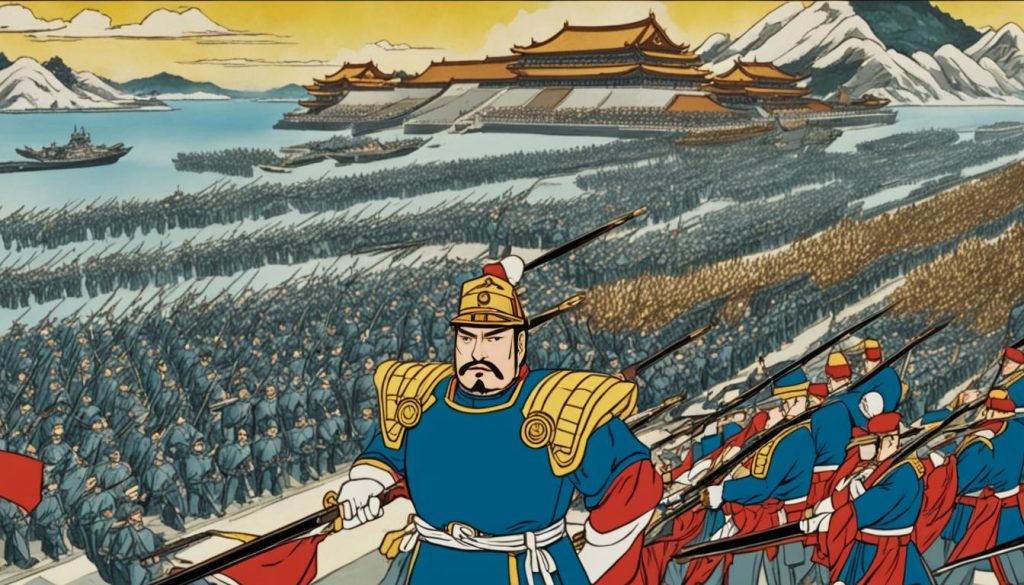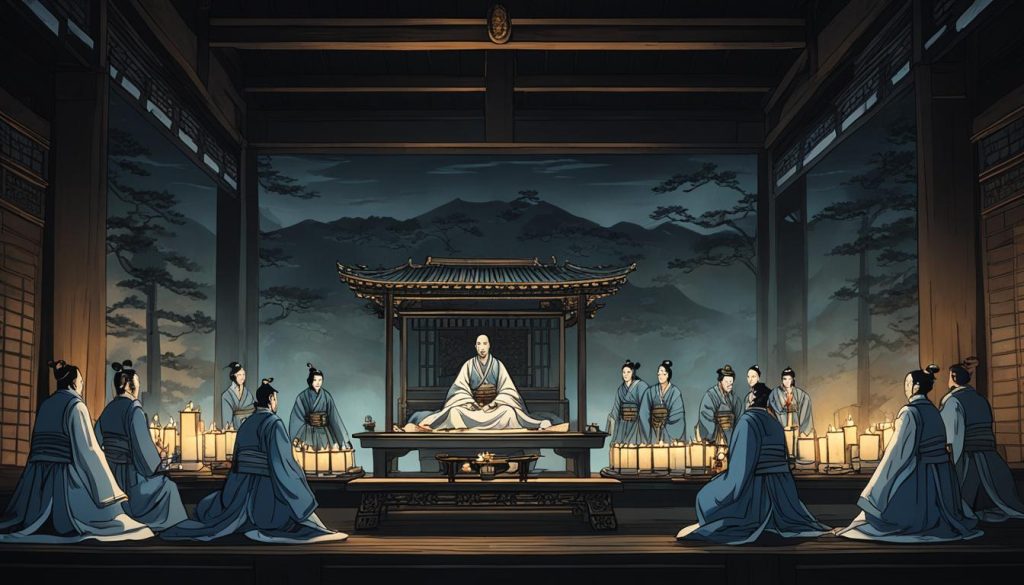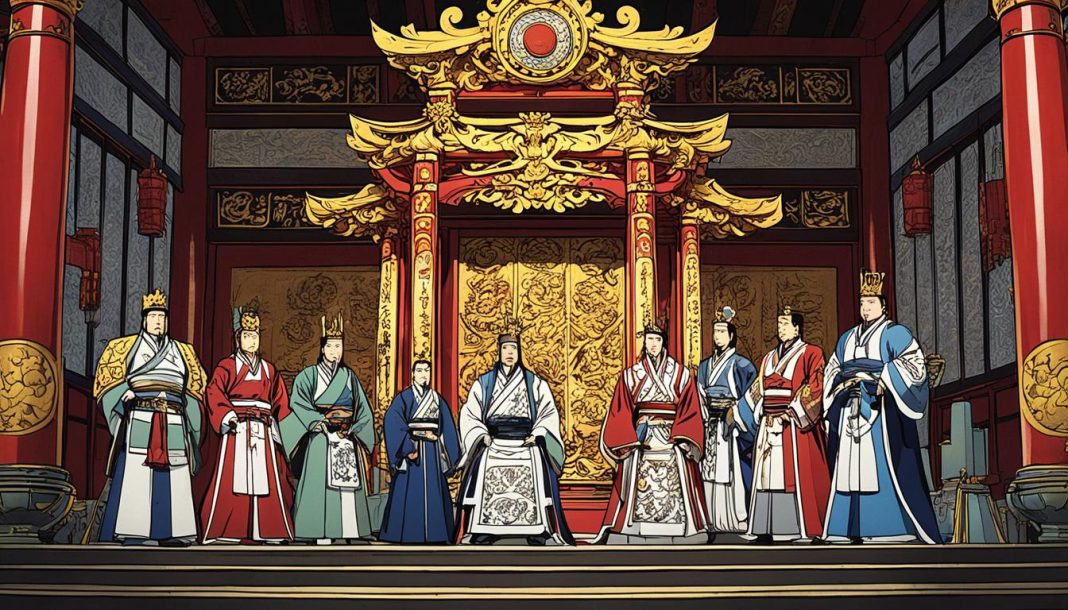Emperor Hongwu, also known as Zhu Yuanzhang, was the visionary founder of the Ming dynasty, ruling from 1368 to 1398. His significant contributions and achievements shaped Chinese history, leaving a lasting legacy that continues to be celebrated and studied today.
Born into a family of impoverished tenant farmers, Zhu Yuanzhang experienced hardship and adversity in his early life. However, his determination and resilience would propel him to rise to power and establish one of the greatest dynasties in China.
Key Takeaways
- Emperor Hongwu, also known as Zhu Yuanzhang, was the founder of China’s Ming dynasty.
- His reign lasted from 1368 to 1398, and he played a crucial role in overthrowing the Mongol-led Yuan dynasty.
- Emperor Hongwu implemented significant political, economic, military, and social reforms throughout his reign.
- The Ming dynasty’s influence extended beyond China, leaving architectural landmarks, cultural contributions, and technological innovations.
- Emperor Hongwu’s legacy and the enduring impact of the Ming dynasty continue to be celebrated and studied in Chinese history.
Early Life and Rise to Power
Zhu Yuanzhang, the future Emperor Hongwu, was born into a family of impoverished tenant farmers in Zhongli County, which is present-day Fengyang, Anhui province. His early life was marked by hardship, and tragedy struck when his family perished during a famine. Despite facing immense challenges, Zhu’s resilience and determination propelled him forward.
Following the loss of his family, Zhu sought refuge in a local monastery and became a monk. However, due to financial constraints, he was unable to continue his studies and was forced to leave the monastery behind.
In the midst of a turbulent political landscape, Zhu joined the Red Turban Rebellion, a rebel force standing against the Yuan dynasty. The rebellion sought to overthrow the Mongol-led Yuan dynasty and restore Chinese rule. Zhu quickly distinguished himself within the ranks and rose to prominence as a military leader.
“Zhu Yuanzhang’s journey from farming to rebellion epitomizes the triumph of determination in the face of adversity.”
– Anonymous Historian
Zhu’s exceptional leadership skills and strategic acumen were evident as he led successful campaigns against the Yuan dynasty. In 1356, he captured the city of Nanjing, establishing it as his base of operations. This significant victory solidified his position and laid the groundwork for what was to come.
The Establishment of the Ming Dynasty
Driven by his vision to bring about change, Zhu Yuanzhang proclaimed himself emperor in 1368, marking the beginning of the Ming dynasty. Renaming himself Emperor Hongwu, he embarked on a mission to consolidate power, stabilize the nation, and establish a prosperous reign.
The image below depicts a momentous turning point in Emperor Hongwu’s life: his capture of Nanjing.
This pivotal event not only symbolized the rebellion’s triumph over the Yuan dynasty but also set the stage for the flourishing Ming dynasty. Emperor Hongwu’s rise to power and the establishment of the Ming dynasty would forever shape the course of Chinese history and leave a lasting impact on the nation.
Continue to [Section 3 Link] to discover the political reforms and tolerance implemented by Emperor Hongwu during his reign.
Political Reforms and Tolerance
Emperor Hongwu’s reign was marked by significant political reforms aimed at strengthening his rule and addressing corruption. One of his key reforms was the abolition of the chancellor position, which centralized power and allowed him to make important decisions more effectively. By reducing the power of court eunuchs, Hongwu was able to diminish their influence and establish a more stable political system.
To maintain order and crack down on corruption, Emperor Hongwu established the Embroidered Uniform Guard. This secret police organization played a crucial role in enforcing the emperor’s authority and ensuring that his reforms were implemented effectively. The Embroidered Uniform Guard acted as a check on the power of government officials and upheld the law throughout the empire.
Emperor Hongwu’s reign also demonstrated a remarkable level of tolerance towards minorities and religions. He ordered the construction and renovation of mosques, showing his support for Islam and fostering an environment of religious pluralism. In the Hundred-word Eulogy, Hongwu praised Islam and recognized the contributions of its followers to the empire.
“The Great Ming embraces all, regardless of their background or beliefs. We are stronger when we appreciate and respect the diversity within our empire.”
These political reforms and the emperor’s commitment to religious tolerance created a more stable and inclusive Ming dynasty. The Embroidered Uniform Guard and the abolition of the chancellor position strengthened Hongwu’s authority, while his support for minorities and religions promoted a sense of unity and harmony within the empire.
Economic and Agricultural Policies
To rebuild the country after years of war, Emperor Hongwu implemented a series of economic policies aimed at promoting agricultural growth and economic stability. These policies included incentives for agriculture, tax reduction, land redistribution, and anti-slavery laws.
One of Emperor Hongwu’s key economic initiatives was the implementation of agriculture incentives. To encourage farmers to cultivate new lands and increase agricultural productivity, he reduced taxes and provided various incentives. These measures aimed to boost agricultural production and ensure food security for the growing population.
In addition to incentives, Emperor Hongwu also prioritized land redistribution. He redistributed land to peasants, confiscating large estates and ensuring a more equitable distribution of resources. This policy aimed to enhance social stability, reduce inequality, and empower the agricultural sector.
“The redistribution of land was a groundbreaking policy that empowered peasants and created a more egalitarian society,” said [expert name], a historian specializing in the Ming dynasty.
Emperor Hongwu also enacted anti-slavery laws, prohibiting the practice of private slavery. By abolishing slavery, he aimed to ensure the fair treatment and freedom of individuals, promoting social justice and human rights.
These economic and agricultural policies implemented by Emperor Hongwu were pivotal in creating a self-sufficient society of self-sustaining farming communities. They promoted economic growth, improved the living conditions of the population, and laid the groundwork for the prosperity of the Ming dynasty.
Military and Naval Exploits
During Emperor Hongwu’s reign, he implemented significant military reforms that bolstered the Ming dynasty’s military capabilities. These reforms played a crucial role in expanding the empire’s rule into Inner Asia and ensuring its dominance over rebel forces. Naval expeditions were also a key component of Hongwu’s military strategy, as he sought to establish diplomatic relations and exert Chinese authority in the Indian Ocean.
One notable aspect of Emperor Hongwu’s naval expeditions was the use of fire ships. These specialized vessels were equipped with combustible materials and used as a tactical weapon to set enemy ships ablaze. The Ming navy’s innovative use of fire ships allowed them to gain significant advantages in naval warfare and secure victories on multiple fronts.
Emperor Hongwu’s military prowess was further demonstrated through his defeat of various rebel forces. Despite facing internal challenges, Hongwu maintained control over the empire and successfully quelled rebellions throughout his reign. These military successes solidified his position as a formidable leader and further solidified the authority of the Ming dynasty.

Social and Cultural Impact
Emperor Hongwu’s reign brought about significant social and cultural reforms that greatly influenced Chinese society. His visionary leadership and reforms transformed various aspects of the empire, leaving a lasting impact on its people.
One of Emperor Hongwu’s notable reforms was the implementation of wide-ranging censuses. These censuses allowed the government to gather comprehensive data on the population, facilitating effective governance and resource allocation. The accurate population data helped in the planning of essential services, such as public infrastructure development and disaster relief efforts.
In addition to conducting censuses, Emperor Hongwu also recognized the importance of education in building a prosperous empire. He reestablished the significance of Confucian education, emphasizing its principles and promoting its teachings. By prioritizing Confucian education, the emperor aimed to foster a society grounded in traditional values and moral ethics.
Introduction of New Crops and Cultural Exchanges
Through extensive trade with Europeans, Emperor Hongwu introduced new crops to China, revolutionizing agriculture and enhancing food production. These new crops, such as maize and sweet potatoes, provided alternative food sources and increased agricultural diversity. The introduction of these crops helped stimulate population growth by improving nutrition and reducing the risk of famine.
Furthermore, Emperor Hongwu’s reign marked the beginning of cultural exchanges between China and Europe. Trade with Europeans brought new ideas, technologies, and goods, enriching Chinese culture. This exchange of knowledge and cultural influences contributed to the vibrant and dynamic society of the Ming dynasty.
To emphasize the significance of these reforms, Emperor Hongwu once said,
“Through meticulous record-keeping and educational reforms, we shall build a prosperous China rooted in the wisdom of Confucian teachings. The introduction of new crops and cultural exchanges will further enhance our society’s progress and foster appreciation for diverse perspectives.”
The impact of Emperor Hongwu’s social and cultural reforms was far-reaching. It led to population growth, improved education, and increased agricultural productivity. These reforms laid the groundwork for a more prosperous and cohesive society, shaping Chinese culture and society for generations to come.
End of Reign and Legacy
Emperor Hongwu, the illustrious founder of the Ming Dynasty, sadly passed away in 1398, leaving behind a flourishing empire and a legacy that would endure for centuries. His death marked the beginning of a new era for the Ming Dynasty, one filled with both challenges and triumphs.
Succession after Emperor Hongwu’s death was far from smooth, as conflicts and power struggles among his successors ensued. This struggle for power culminated in the Jingnan Rebellion, a rebellion that tested the stability of the fledgling dynasty. However, despite these internal struggles, Emperor Hongwu’s enduring influence as the dynasty’s founder remained unshaken.
The Ming Dynasty would go on to rule China for nearly 300 years, leaving an indelible mark on Chinese history. Known for its enlightened governance, splendid culture, and profound societal impact, the Ming Dynasty profoundly shaped the course of the nation.

“The true measure of a great ruler lies not only in their lifetime achievements, but in the enduring influence they leave behind.” – Emperor Hongwu
Legacy and Impact on Chinese History
The legacy of Emperor Hongwu and the Ming Dynasty is woven deeply into the fabric of Chinese history. His visionary leadership and administrative reforms laid the foundation for a prosperous and thriving dynasty. The unyielding commitment to economic growth, political stability, and social welfare reshaped the nation.
The enduring influence of the Ming Dynasty is evident in various aspects of Chinese culture, society, and governance. From awe-inspiring architectural landmarks such as the awe-inspiring Forbidden City to advancements in art, literature, and technology, the Ming Dynasty left an indelible mark on the nation.
Furthermore, the Ming Dynasty’s cultural exchange and trade with Europeans opened doors to new ideas, fostering a climate of innovation and discovery. This period witnessed the introduction of new crops, the progression of navigational techniques, and the rise of scientific endeavors.
Emperor Hongwu’s chronicled reign and the subsequent Ming Dynasty’s achievements have contributed immensely to Chinese history. Their impact endures, reminding us of the profound influence great leaders can have on shaping the destiny of a nation.
Ming Dynasty Achievements and Contributions
The Ming dynasty, founded by Emperor Hongwu, witnessed remarkable achievements and made significant contributions in various fields. This golden era of Chinese history saw advancements in art and literature, leaving behind a rich cultural legacy.
“The Ming dynasty flourished as a center for artistic and literary expression, with notable works that continue to inspire and captivate audiences today,” states renowned art historian, Dr. Li Mei.
The dynasty’s architectural landmarks, such as the awe-inspiring Forbidden City and the majestic Great Wall, stand as enduring testaments to Ming craftsmanship and grandeur. These iconic structures continue to fascinate visitors from around the world.
In addition to artistic and architectural achievements, the Ming dynasty also witnessed remarkable technological innovations. Among them was the development of gunpowder weapons, which revolutionized warfare and had a profound impact on military strategies of the time.
The cultural influence of the Ming dynasty extended far beyond China’s borders. The dynasty’s prosperous economy and well-established trade networks facilitated cultural exchanges with neighboring regions and even distant lands. This influence on East Asian culture can still be felt today.
Conclusion
Emperor Hongwu, also known as Zhu Yuanzhang, was a formidable leader who left an indelible mark on Chinese history. As the founder of the Ming Dynasty, his military prowess, political reforms, and economic policies laid the foundation for a prosperous and enduring dynasty.
The impact of the Ming Dynasty, under Emperor Hongwu’s rule, continues to be felt to this day. The architectural landmarks constructed during this period, such as the Forbidden City and the Great Wall, stand as a testament to the dynasty’s grandeur and cultural contributions. Additionally, the Ming Dynasty’s influence on East Asian culture influenced art, literature, and societal norms.
The legacy of Emperor Hongwu and the Ming Dynasty holds significant historical significance. His military reforms strengthened the empire’s defenses, ensuring stability and security. His political reforms, such as the reduction of eunuch power and crackdown on corruption, established a more efficient and accountable government. Emperor Hongwu’s economic policies, including land redistribution and agricultural incentives, created a self-sustaining society and stimulated economic growth.
The enduring influence of Emperor Hongwu and the Ming Dynasty cannot be overstated. From advancements in art and literature to architectural landmarks and technological innovations, their contributions shaped Chinese history and had a lasting impact on East Asian culture. Today, the legacy of Emperor Hongwu is celebrated and studied as a pivotal period in Chinese history.
Source Links
- https://www.britannica.com/biography/Hongwu
- https://en.wikipedia.org/wiki/Hongwu_Emperor
- https://en.wikipedia.org/wiki/Ming_dynasty
Related Article
























